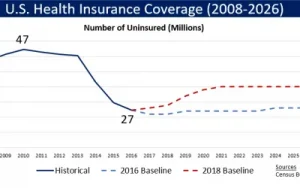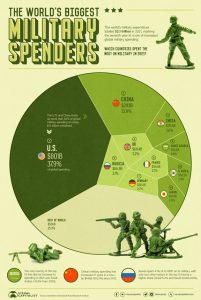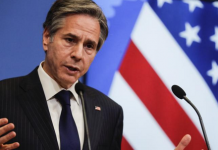The US is the only developed nation without a guaranteed baseline of health insurance, and it is self-inflicted.
The United States has among the best doctors and scientists and the most impressive medical and research institutions on the planet – and yet its healthcare for many citizens is a badly out of whack. Politicians have convinced people to accept an absurd situation because nothing supposedly can fix it — yet other countries do way better.
For readers who have never had the pleasure, here’s what Americans are resigning themselves to:
- Health insurance is generally provided by private insurance companies whose profit depends on covering or refunding as little as they can get away with. So brilliant minds deploy every clever trick, from impenetrable voice menus to “copays” (meaning coverage is partial) to the disqualification of “preexisting conditions.” Yo insurers: Mortality is a preexisting condition!
- For people under 65, health insurance is generally accepted as something somehow connected to employment. It is a “benefit” some employers offer by covering most but not all of a certain insurance plan. Why should health depend on employment? What’s the connection? How is it more relevant than the zodiac?
- People over 65 (and a few others) benefit from state-run Medicare, which is something, but the younger unemployed and self-employed have few options and no cheap ones. They must pay for private plans and hope for minimal discussion of preexisting conditions.
- Anything Americans pay for directly is an expense drama for anyone but the rich — so people tend to put it off. One reason is that so much of the ecosystem is for-profit. Another is hyper-litigiousness, a separate but highly related problem which drives up doctors’ own insurance costs and benefits mainly lawyers (who typically form the largest professional group in Congress).
As a result of this inefficiency Americans spend over $12,000 annually on healthcare, which is far more than in any developed country. Much of it is that medicines and doctors’ visits are highly expensive; living abroad for decades I perform the comparisons each time I visit; medical eye drops I regularly require, which set me back $60 at CVS, cost literally a tenth of that in rich countries across the pond.
The results for the wealthy are still good, because the country creates and attracts the best talent and its available for a price. For those who can afford it or are selected for trials, a terrible disease is still most likely to be cured in the United States. But for most people it’s not working out nearly as well. A Gallup study last month showed that a quarter of Americans skip doctor’s appointments because of price jitters and almost half are concerned about being able to afford needed health care in the near future; these are not things you generally hear in Germany or Japan.
The result manifests in embarrassing global well-being rankings by the World Health Organization or research groups — and in the shocking fact that unlike in other developed countries US life expectancy has declined by several years since its high in 2014.
For perspective on this disastrous landscape from a true expert, read a three-year-old essay in Scientific American by Dr. Clay Marsh, chancellor and executive dean of health sciences at West Virginia University. He speaks of an ecosystem that makes a business out of sickness in an environment of unchecked capitalism, and offers fixes.
Will anybody listen? America’s toxic politics are poisoning the discussion.
The Democrats want to ensure as many Americans as possible have baseline healthcare. There are numerous proposals floating around including the Medicare for All idea (which some insist on calling “single payer” as if to make it seem bureaucratic and expensive). Republicans oppose anything even close to that since they see “big government” as inefficient. The schemes would indeed face funding challenges, but the US is the only advanced society where the principle itself is in dispute.
I lived in Britain for years and met no one seeking to cancel the National Health Service (in the past year the fact that it is underfunded has become a national scandal that many expect to help bring the Conservative Party down). The squabbling Israelis seem united only in appreciation of their “Kupat Holim” health clinics system. Versions of universal health insurance exist everywhere from France to even Egypt, from New Zealand to the Nordics, and obviously in Canada. No one fumes about fabulist “death panels,” frets about bogus “communism” or assigns progressive programs bureaucratic-sounding labels.
There’s no big mystery about funding — it’s baked into taxes, and the only question is how to divide the pie.
National tax burdens vary, which can be looked at different ways. According to an authoritative study by the TAx Foundation, the burden in Canada, which some Americans mock as a socialist state, is about 30% of wages, while in the US it is 28%; that doesn’t seem so high a price for getting rid of the problem. Israel’s burden compared to wages is 22%, and New Zealand’s is 19%. The average in the OECD, the club of rich nations, is 34.6%. Most of Europe ranks just higher, just as you’d expect, but the people there like their healthcare (and free college thrown in to boot — another area where US exceptionalism may not be so great).
It should be noted that the US figure plummets to the low 20s if you look at tax burden as a percentage of GDP, due to low corporate and other non-payroll taxes. That means that the American worker actually is not living in a capitalist paradise with low taxes – only shareholders and business owners are.
Here’s one clear way in which the political kerfuffle is devastating to ordinary people.

By the end of the George W. Bush presidency the number of Americans without health insurance reached 47 million, or about a seventh of the population, according to the census bureau.
Barack Obama’s Affordable Care Act could not fix the problem directly as other countries do because of Republican opposition; instead it fiddled around with complex mechanisms to encourage and mandate health insurance through the existing system and new “exchanges” meant to mitigate the pre-existing conditions problem. Under this half-solution the number of uninsured fell to 27 million, saving untold numbers of lives.
Even that small victory was too much for the Republicans. Donald Trump tried and failed in 2017 to repeal Obamacare — but succeeded in weakening and underfunding it such that almost 10 million rejoined the ranks of the uninsured, whose numbers reached 35 million. How brilliant did that look during the coronavirus crisis?
Now Joe Biden has his hands full with all kinds of problems, including one named Joe (Manchin). We understand that solid Democratic control of Congress might yield reasonable gun control and national abortion rights. But so entrenched are positions on healthcare that almost no one speaks the obvious: the Democrats could also expand Medicare, and take other measures to establish sanity and align with the world.
What would fund a shift? You might want to look at the US military budget which is approaching a trillion dollars a year, is at a global-historic record, and accounts for a third of the world’s defense expenditure. Is this not big government? Is there no inefficiency there? Look close and see: that’s where death panels can be found.

















